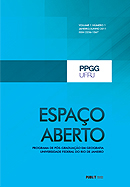Spatial Estimates: Quality and Correlation of Distance Square Inverse Spatial Interpolators and Kriging
DOI:
https://doi.org/10.36403/espacoaberto.2022.52588Keywords:
Geostatistical Interpolators, Distinct Sampling, Comparative Study.Abstract
Spatial interpolation assists in the analysis of spatial phenomena, however there are few comparative studies evaluating parameters for precision, smoothing, configuration and universality of methods. Consequently, the quality and correlation of spatial estimates of deterministic inverse distance squared (IDS) models and geostatistical models of kriging in different sample universes, the quality of kriging performed in different software and data sources are evaluated in this article. The operational procedures for this comparative study were performed in a GIS environment. The results point to an increase in the average error for scenarios with small samples in the analyzed software, but the error is more pronounced in ArcGis (86%), and lower in Spring (61%) programs. In reference to comparison between methods and software, a significant reduction in correlation was found to exist with the reduction of the sample universe in all analyzed scenarios.
Metrics
No metrics found.


